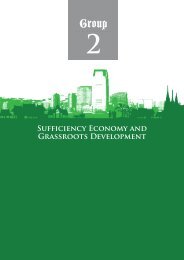Conflict, Legitimacy and Government Reform: Equitable Allocation of ...
Conflict, Legitimacy and Government Reform: Equitable Allocation of ...
Conflict, Legitimacy and Government Reform: Equitable Allocation of ...
You also want an ePaper? Increase the reach of your titles
YUMPU automatically turns print PDFs into web optimized ePapers that Google loves.
Panel Discussion<br />
I speak about these matters as a former college pr<strong>of</strong>essor <strong>of</strong> political<br />
science, but also as someone with certain government experiences.<br />
I worked for several years as a staff member <strong>of</strong> the House <strong>of</strong><br />
Representatives’ Foreign Affairs committee <strong>and</strong> as the senior foreign<br />
policy adviser to a US Senator. I learned, <strong>of</strong>ten to my horror, how the<br />
legislative process really works, in contrast with the neat <strong>and</strong> tidy<br />
textbooks I had studied in graduate school. I saw personally how <strong>of</strong>ten<br />
elected representatives’ decisions are based on no or fragmentary<br />
information <strong>and</strong> the power that unelected staff pr<strong>of</strong>essionals have in<br />
shaping what does or doesn’t get done in Washington. I crossed over to<br />
the “other side” <strong>and</strong> worked for four years as a member <strong>of</strong> the Clinton<br />
Administration at the Department <strong>of</strong> State <strong>and</strong> the White House. I saw<br />
from the perspective <strong>of</strong> the executive branch how comparatively “easy”<br />
it was to pass laws that were never executed <strong>and</strong> how difficult governing<br />
according to principles could be. I saw great political courage, but more<br />
<strong>of</strong>ten striking political weakness when decisions were made to advance<br />
the political ambitions <strong>of</strong> a person or a party at the expense <strong>of</strong> the<br />
national interest.<br />
I reflect on these experiences now from the distant shores <strong>of</strong><br />
California. I <strong>of</strong>ten joke to friends still gripped by “Potomac Fever” that<br />
I have “given up” on adults <strong>and</strong> now work with children in my role as<br />
director <strong>of</strong> international programs at the Center for Civic Education.<br />
Like many factitious comments this one contains a grain <strong>of</strong> truth: young<br />
people are the final hope <strong>of</strong> all societies, including mine, <strong>and</strong> we risk the<br />
future <strong>and</strong> squ<strong>and</strong>er the present if we do not invest in doing the best we<br />
can for them now.<br />
I appear on this podium I am sure not because <strong>of</strong> this background<br />
or the expectation that I will <strong>of</strong>fer some pr<strong>of</strong>ound insights on the<br />
questions posed by the “Rationale.” Rather I suspect it is because I have<br />
the privilege <strong>of</strong> working with KPI in an effort to deliver on the promise<br />
all generations make to their young: to leave our children a world that is<br />
a better place than we found it. This is a very easy thing to say <strong>and</strong> a very<br />
difficult thing to accomplish. But together KPI <strong>and</strong> CCE are doing our<br />
best to fulfill this promise <strong>of</strong> each generation to the next.<br />
77














